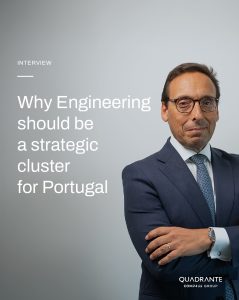
Quadrante is the company that designs Engineering, Architecture, Environment, and Sustainability projects.
It focuses on the Energy, Mobility, and Sustainable Cities sectors. In every wind farm, for example, the likelihood of Quadrante engineers being involved is high, as we are talking about the largest engineering company in Portugal, roughly three times the size of the second-largest.
In an interview, Nuno Costa, CEO of Quadrante, talks about some projects in Portugal:
“We were responsible for the expansion of the Lisbon and Porto metro networks; for the project to expand airport capacity in the Lisbon region. In the field of energy transition, we participated in renewable energy projects and in projects related to lithium extraction and conversion in Portugal. We also developed the project for the new gigafactory in Sines, as well as several green hydrogen and biogas units. In sustainable cities, we have been responsible for multiple projects improving water supply and drainage systems, among many others. We carried out the engineering project for the new Lisbon Eastern Hospital, known as Hospital de Todos os Santos.”
Only 30% of Quadrante’s activity is in Portugal, as the company positions itself as a global player. The CEO explains:
“We are currently present in more than 20 countries, organized into four markets, each with its own manager.”
Thus, they operate in Portugal, the Middle East, and Africa on one hand; Spain and Latin America on another; Romania and Eastern Europe; and finally Brazil and Chile.
“We operate through local subsidiaries — in Spain, Brazil, Chile, Colombia, Peru, and Mozambique, for example — and also with representative offices in strategic markets, which allows us cultural, legal, and client proximity,” he explains. “We have a clear expansion strategy,” he reveals.
“The next major step is the North American market, where we have just hired a CEO and established a joint venture with a local company. The US is a sophisticated and demanding market, but very large and in need of significant energy infrastructure improvement. Our entry is not limited to transmission and distribution: we also want to be involved in renewable generation,” he reveals.
This comes at a time when the Trump administration is divesting from “green energy.” This does not stop Quadrante, as:
“Regardless of political cycles, the energy transition is unavoidable, given the pressing need to increase energy production,” defends Nuno Costa.
“These needs can hardly be met solely through ‘traditional’ generation methods, as renewable energy has much faster implementation cycles. It will therefore certainly form part of the diversified production portfolio required in any country,” he adds.
“We will also continue to strengthen our presence in Eastern Europe, Latin America, and Africa, in areas where we believe we have differentiating know-how,” the CEO states.
A year ago, Quadrante acquired Meta Engineering, a Spanish consultancy and engineering group in sustainable mobility and renewable energy production, as well as 3Drivers, the leading Portuguese consultancy in circular economy.
The acquisition of Meta Engineering and its subsidiary Izharia (Energies) “added critical skills in sustainable mobility and renewable energy, strengthening our presence in Spain and LATAM,” consolidating the Group as a relevant Iberian player.
Nuno Costa warns that:
“In Portugal, the US, Spain, and many Latin American countries, a deep network overhaul is required.”
He adds:
“Capacity needs to be reinforced, infrastructures digitized, storage integrated, and the grid adapted to allow decentralized production and to meet the needs of new consumers, such as data centers.”
He argues that investment should be led by network operators, but in partnership with private investors and under clear government regulatory frameworks.
There is a wave of data centers coming to the Iberian Peninsula because of AI, and Nuno Costa says:
“Portugal has important conditions to attract a significant set of such investments. We have competitively priced energy due to the penetration of renewables, geographic advantages, and submarine cables connecting us to Europe, America, and Africa.”
He considers that artificial intelligence will require massive data capacity and that Portugal can capture part of that investment.
“In Portugal, engineering is not well treated. Just look at how the public sector often purchases engineering services based on the lowest price,” he says.
Nuno Costa even argues that:
“Engineering should be considered a strategic cluster in Portugal, as already happens with tourism or renewable energies,” because, he says, “we have talent, universities, competitive companies, and a very solid engineering tradition. In the 1960s, Portuguese engineering was recognized worldwide. Nothing prevents Portugal from regaining that position.”
He emphasizes that in this industry:
“The greatest investment is in talent, specifically engineers, architects, and specialists. It is a highly competitive field.”
In 2024, the Group reached 106 million euros in global revenue.
“In 2025 we expect to grow to 125 million, with solid EBITDA generation. We aim for an even more important result: to ensure the continued satisfaction of our clients and our more than one thousand employees.”
Over the past five years, they have grown sales by 35% per year. The CEO also acknowledges that:
“The entry of the private equity fund Henko brought increased management discipline and a strengthened international vision.”
